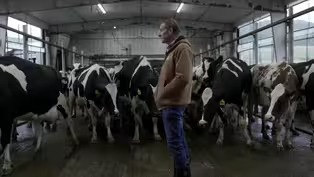
Inside Afghanistan’s worsening humanitarian disaster
Clip: 1/14/2024 | 6m 36sVideo has Closed Captions
Inside Afghanistan’s worsening humanitarian disaster as aid funding falls short
Since the Taliban reclaimed control of Afghanistan in 2021, the country has plummeted further into political and economic instability. Frequent natural disasters and shortfalls in donor funding make the dire situation one of the worst humanitarian crises in the world. Dayne Curry, the Afghanistan country director for Mercy Corps, joins Ali Rogin to discuss.
Problems playing video? | Closed Captioning Feedback
Problems playing video? | Closed Captioning Feedback
Major corporate funding for the PBS News Hour is provided by BDO, BNSF, Consumer Cellular, American Cruise Lines, and Raymond James. Funding for the PBS NewsHour Weekend is provided by...

Inside Afghanistan’s worsening humanitarian disaster
Clip: 1/14/2024 | 6m 36sVideo has Closed Captions
Since the Taliban reclaimed control of Afghanistan in 2021, the country has plummeted further into political and economic instability. Frequent natural disasters and shortfalls in donor funding make the dire situation one of the worst humanitarian crises in the world. Dayne Curry, the Afghanistan country director for Mercy Corps, joins Ali Rogin to discuss.
Problems playing video? | Closed Captioning Feedback
How to Watch PBS News Hour
PBS News Hour is available to stream on pbs.org and the free PBS App, available on iPhone, Apple TV, Android TV, Android smartphones, Amazon Fire TV, Amazon Fire Tablet, Roku, Samsung Smart TV, and Vizio.
Providing Support for PBS.org
Learn Moreabout PBS online sponsorshipthe country has plummeted further into# political and economic instability,## frequent natural disasters and shortfalls# in aid funding exacerbate the dire situation## making it one of the worst humanitarian# crises in the world.
Ali Rogin has more.
ALI ROGIN: Almost two-thirds of Afghanistan's# population are currently in need of humanitarian## assistance, a 45 percent increase# since the Taliban takeover.
Meanwhile,## donor fatigue has left a humanitarian funding gap# of $1.3 million.
And in the impoverished West,## a string of powerful earthquakes last# fall killed more than 1,300 people.## Another 6.4 magnitude earthquake# hit this region just this week.
And now the country is facing an influx of# returnees being expelled from neighboring## Pakistan following that country's announcement# that Afghan migrants were no longer welcome.## Dayne Curry is the Afghanistan director# for Mercy Corps, a global humanitarian## organization in town this week.
Thank# you so much, Dayne, for joining us here.
Can you first give us an update on just what## life is like these days for# the average Au DAYNE CURRY, Afghanistan Director,# Mercy Corps: Well, certa humanitarian cha particularly economically for the country,# especially when there have been mult emergencies facing the country both with the# earthquake, and with the returning situatio It is a challenge for these communities# to recover.
The earthquakes in Herat## were incredibly devastating.
I visited one# community where of the 150 villager were living in that community only five# survived.
The impact of the earthquake## was severe.
And it's going to take a# long time for the recovery to occur.
When you then add additional regional issues# such as the returnees maybe as many as a## million people coming back from Pakistan into# an already challenging economic situation, it## just creates even more challenges for the ordinary# Afghans to be able to make ends meet day to day.
ALI ROGIN: And I know it's even harder# for women and girls in Afghanistan,## what is the situation like for them now?
DAYNE CURRY: We're very we obviously can note the social and# political challe But the humanitarian challenges# are of prime importance to us,## it is incredibly important that women and girls# have access to humanitarian aid, and we work to## engage the authorities to ensure that they# are able to have access to that assistance.
You know, for many women in Afghanistan,# it's just a question of how they provide## food for their families that their children are# able to get enough to eat that they drinking water.
In some communities, women# girls are forced to walk two or three ho one way just to be able to find clean# drinking water to use in their homes.
And so we need to address all of# those challenges and situations.## And that's the priority for us# as a humanitarian organization.
ALI ROGIN: And how have the earthquakes# affected the work that you do th is humanitarian aid to where it needs to go?
DAYNE CURRY: Well, thankfully, we, along# wi rapidly to the earthquake.
The importance# for what we see with the earthquake now is## beyond just the initial emergency support.# Beyond that first surge of assistance is## the long term recovery efforts that# will be needed for these communities.
This isn't just a one dump of assistance,# it needs to be a long term commitment to## make sure that the resilience# in Herat province is possible,## and that people are able to recover in a way that# doesn't further exacerba ALI ROGIN: And as you just mentioned,# there's going to be an influx of up## to a million Afghans returning.
How does# DA YNE CURRY: Potentially, it could be a# million more, it's already a half a million,## could be a million more.
And# the thing to remember is that## just because they're coming across# the bord they're not saying there.
They're returning to# their communities of origin an And these communities are already stretched.# They may not have clean drinking water.
They## may not have jobs.
They may not have# just basic means to support themselves.## So when you add that many more people into the# situation, it underlines the need for funding## and assistance that will be committed# to the Afghan people for the long haul.
ALI ROGIN: And the hunger crisis# is of course also worsening,## the World Food Programme had to cut back# its and now can only help one in five.
How# is that affecting the overall situation?
DAYNE CURRY: It affects it significantly.# It's important to remember while th emergency assistance going into these communities,## and that's essential to provide that emergen there's efforts to support agriculture# and livelihoods, ways for communities## to be able to provide for themselves, so# they're not wholly dependent on food aid.
And when there are reductions of emergency# support, it stresses the importance of## trying to be more strategic with that# funding.
So the Afghans can have their## own agency to take care of their needs# and not be so reliant on that assistance ALI ROGIN: State Department, USAID# officials have been on Capitol Hill## this week testifying about the situation# in Afghanistan Affairs Committee Chairman Michael McCaul had# to say about the situation post withdrawal.
REP. MICHAEL MCCAUL (R) Texas: There# are no plans to ensure enduring peace,## or to support the Afghan people.
And now# under the admini Afghanistan continues to deteriorate every day.
ALI ROGIN: We know that many of these# issues in Afghanistan right now pr ior to the Taliban takeover.
But I# wonder what do you see as some of the## solutions that you would like the United# States and other partners to focus on?
DAYNE CURRY: Well, the United States# is obviously the largest donor to## Afghanistan and a significant part# of what we do we're thankful for the## assistance that the American people continue# to provide for Afghanistan and it's vit What we would urge the United States# government is to not only consider the amount## of funding that they're giving, but how they# strategically use that money, like I menti resilience for Afghan communities as important,# helping Afghan farmers to grow more via helping Afghan women to access the job market,# and to be able to have the skills to do that.
These are all important resilient steps that# that can be provided for the Afghan people## so that the aid that goes into Afghanistan is# more effective than it has been in the past.
ALI ROGIN: What are the messages# you're hearing from stakeholders## who are reluctant to provide that donor# money, especially citing making it even harder for, for example,# women to find those jobs that you mentioned.
DAYNE CURRY: We understand the concerns# and the challenges that donor funding going## into Afghanistan presents, it has for long time# presented many challenges, and we as organizations take integrity with that funding# very seriously.
We have measures in place to## ensure that the funding that we provide to Afghan# people reaches the people that it's intended to## reach and can be used most effectively to provide# assistance to people in a sustainable way.
ALI ROGIN: Dayne Curry, Afghanistan Director for# Mercy Corps.
Thank you so much for your time.
DAYNE CURRY: Thank you very much.
How communities are tackling a suicide crisis among farmers
Video has Closed Captions
Clip: 1/14/2024 | 9m 9s | How rural communities are tackling a suicide and depression crisis among farmers (9m 9s)
What Iowa voters are thinking on frigid eve of 2024 caucuses
Video has Closed Captions
Clip: 1/14/2024 | 5m 43s | What Iowa Republican voters are thinking on frigid eve of 2024 caucuses (5m 43s)
Providing Support for PBS.org
Learn Moreabout PBS online sponsorship
- News and Public Affairs

FRONTLINE is investigative journalism that questions, explains and changes our world.

- News and Public Affairs

Amanpour and Company features conversations with leaders and decision makers.












Support for PBS provided by:
Major corporate funding for the PBS News Hour is provided by BDO, BNSF, Consumer Cellular, American Cruise Lines, and Raymond James. Funding for the PBS NewsHour Weekend is provided by...

